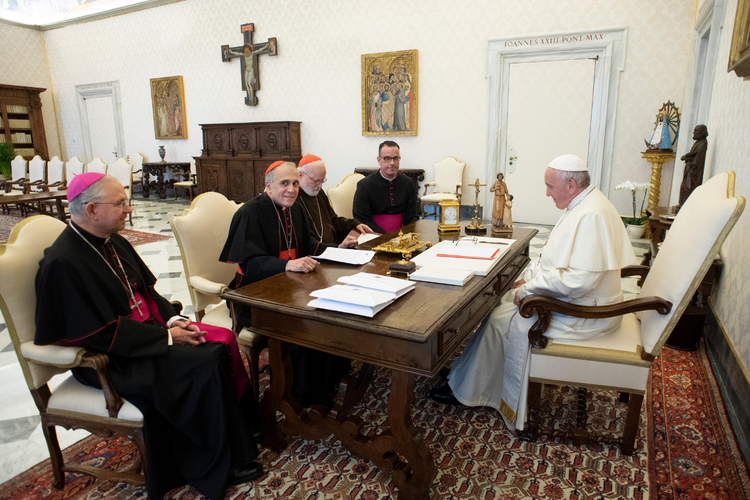Basic Flaws
"[Its] basic flaw ... has always exempted the bishops [from independent oversight. The fundamental need is to answer the question as to how Archbishop McCarrick and others rose in their ecclesiastical careers when troubling facts regarding sexual abuse were known by the hierarchy which promoted them."
"We asked how many trials have you done on the accused priests. Scicluna said he was getting empty files from bishops. They didn't want to release information to the Holy See because they feared subpoena power [from lawyers representing victims]. Bob [Bennett] told Scichluna to tell them to send the files, they'll get a subpoena anyway."
"Where are we today? At the same place. We know what we suspected then, but it's now affirmed: we cannot trust the hierarchy of the Catholic Church."
Judge Anne Burke, Chicago, Illinois Supreme Court Justice
"What he's [Pope Francis] got to be seen to be doing is pushing for a very rigorous policy. Can he do that if he himself has not been as diligent, to say the least, as he should be?"
"It's too early to say, but just looking at the case, it looks very bad. It seems like a violation -- is he the guy [Cardinal Daniel DiNardo] who should be leading at this point?"
David Gibson, director, Center on Religion and Culture, Catholic university Fordham
"We shared with Pope Francis our situation in the United States -- how the Body of Christ is lacerated by the evil of sexual abuse. He listened very deeply from the heart."
". . . It was a lengthy, fruitful, and good exchange."
Cardinal Daniel DiNardo, Galveston-Houston, president, U.S. Conference of Catholic Bishops
 |
| Pope Francis meets with officials representing the U.S. Conference of Catholic Bishops at the Vatican Sept. 13. Pictured from left are Archbishop Jose H. Gomez of Los Angeles, vice president of the conference, Cardinal Daniel N. DiNardo of Galveston-Houston, president of conference, Cardinal Sean P. O'Malley of Boston, president of the Pontifical Commission for the Protection of Minors, and Msgr. J. Brian Bransfield, general secretary of the conference. (CNS photo/Vatican Media) |
Cardinal DiNaro stands accused of mishandling the case of the Reverend Manuel La Rosa-Lopez, arrested in Conroe, Texas earlier in September on four counts of indecency with a child. According to police, La Rosa-Lopez fondled two teens while a priest at a Conroe church. He was engaged at another church in Richmond Texas, as their priest, at the time of his arrest. So much for the church cleansing itself of its habit of overlooking the priestly-celibate-behaviour of its clerics in their abuse of parishioners.
The meeting with Pope Francis to discuss the crisis of sexual abuse with the leaders of American Catholics was a friendly affair, smiles and graciousness all around. That Cardinal DiNardo, president of the U.S. Conference of Catholic Bishops was accused of yet again covering up actions of an abusing priest in his archdiocese was simply business as usual. Yet there were some among the lower-echelon clerics who impudently asked whether, under those circumstances, DiNardo was the right man to head such reforms.
The summer of 2018 saw one cardinal resign and another stating he might just do the same. Yet another bishop was removed by Pope Francis from ministry; Michael J. Bransfield of West Virginia now faces a church investigation on charges of sexual harassment. While the meeting between Pope Francis and the bishops who met with him was cordiality personified, the business of actually discussing plans of reform appear to have been overlooked.
Even as Cardinal DiNardo was preparing for that meeting, a woman came forward to claim she informed him of an abusive priest in his Texas archdiocese. All well and good, but nothing was done, DiNardo took no action to remove that priest from ministry. Until finally it was taken out of his hands when the offending priest was arrested on charges of child abuse some time later. All this, following on the Pennsylvania grand jury report of the month before detailing allegations of abuse by over 300 priests in that state alone.
A shocking set of revelations that set off similar investigations to take place in Missouri, Nebraska, New Jersey, New Mexico, and New York. Of course there were credible and verifiable reports that Pope Francis himself had indulged in protecting and covering up for those of his esteemed colleagues who had themselves done the same for their underlings, loathe to submit the venerable church to public scrutiny and the offensive effect of legal authorities taking priests into custody. So who will be investigating the Pope?
Labels: Catholic Church, Investigaton, Pope Fancis, Scandal, Sexual Predation

<< Home